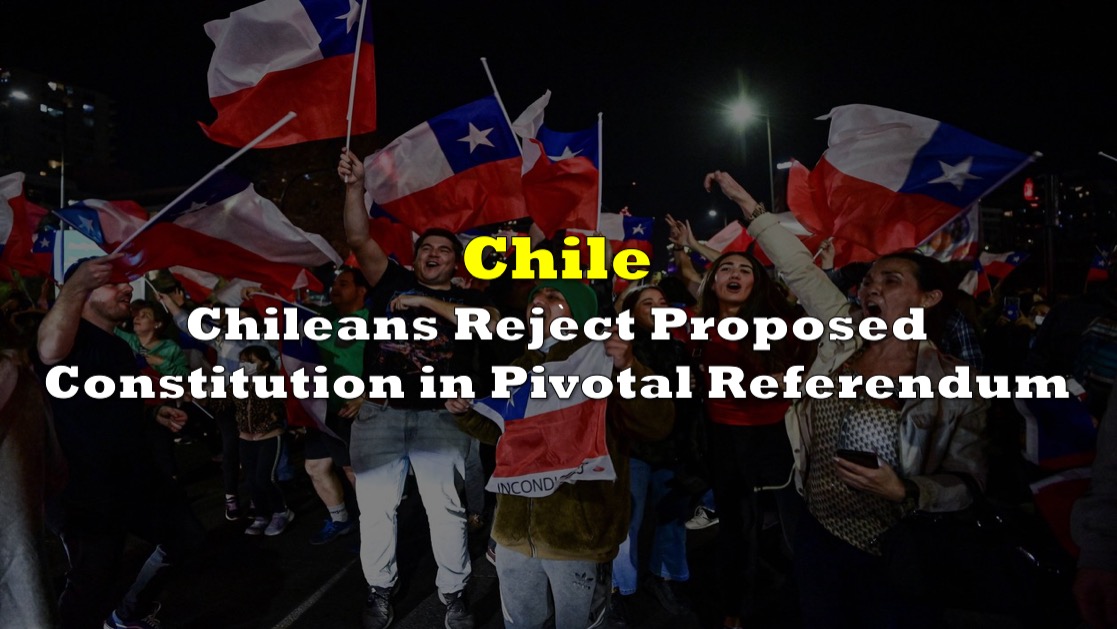In a decisive move, Chileans have voted against the adoption of a new constitution, dealing a blow to the four-year effort to reshape the nation’s foundational document. The rejection, with 55.7% of voters opting against the new text and 44.3% in favor, underscores the deep polarization within the country.
The 2023 draft, which failed to gain approval, was perceived as more conservative on certain issues compared to Chile’s existing pro-business constitution, originally established in 1980 under dictator Augusto Pinochet but later extensively reformed. The proposed amendments included provisions safeguarding the private sector’s involvement in health, pensions, and education, advocating for the expulsion of undocumented migrants, and restricting the right to strike to workers engaged in collective negotiations.
The defeat of the proposed constitution marks a setback for Chile’s leftist president, Gabriel Boric, who had been a proponent of the 2022 proposal. Rightwing politicians framed Sunday’s referendum as a verdict on Boric’s presidency, which has faced challenges amid a corruption scandal.
“I invite you to build together a new era for Chile: growth for all, social justice and citizen security. The country needs everyone,” Boris wrote on X in Spanish.
Les invito a que construyamos juntos una nueva etapa para Chile: de crecimiento para todos, justicia social y seguridad ciudadana. La patria necesita de todos y todas. pic.twitter.com/FnmqWHz3nq
— Gabriel Boric Font (@GabrielBoric) December 18, 2023
Chile’s journey towards constitutional reform began in late 2019, triggered by mass protests addressing issues of inequality and the high cost of living. The legitimacy of the Pinochet-era document was widely contested by demonstrators and many politicians. However, the subsequent attempts to produce a widely acceptable charter faced hurdles due to escalating polarization.
The prolonged uncertainty stemming from the constitutional reform process has taken a toll on Chile’s economy, with the OECD projecting a 0.1% contraction this year. Analysts argue that the inability to pass significant legislative reforms to address social discontent has added to the challenges. Boric’s coalition lacks a majority in congress, and attempts to increase taxes for enhanced social spending and pension system overhauls have been blocked by rightwing parties.
The composition of the 51-seat body responsible for drafting the new proposal, elected after the rejection of the 2022 effort, was dominated by the far-right Republicanos party and the mainstream conservative Chile Vamos coalition, holding 22 and 11 seats, respectively. Notably, several articles were approved without support from the 17 leftwing councillors or an independent indigenous representative.
Leftwing leaders voiced concerns over specific articles, including those reducing taxes on high-value properties, diminishing state oversight of school curriculums, and altering language related to “the right to life of the unborn.” Critics argue that these changes might open the door to legal challenges against the limited exceptions to Chile’s abortion ban.
Despite the setback, both Boric and his coalition parties have pledged not to initiate a new constitutional rewrite process. Instead, they may pursue targeted reforms to specific sections of the constitution, according to Kenneth Bunker, a politics professor at Santiago’s San Sebastián University. Bunker expressed hope that the recent referendum would signal the end of the broader constitutional debate, allowing Chile to refocus on growth and development. However, he acknowledged that the nation currently finds itself at a standstill, reminiscent of its position four years ago.
Information for this briefing was found via Financial Times and the sources mentioned. The author has no securities or affiliations related to this organization. Not a recommendation to buy or sell. Always do additional research and consult a professional before purchasing a security. The author holds no licenses.









